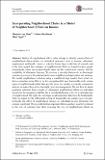Incorporating neighborhood choice in a model of neighborhood effects on income
Abstract
Studies of neighborhood effects often attempt to identify causal effects of neighborhood characteristics on individual outcomes, such as income, education, employment, and health. However, selection looms large in this line of research, and it has been argued that estimates of neighborhood effects are biased because people nonrandomly select into neighborhoods based on their preferences, income, and the availability of alternative housing. We propose a two-step framework to disentangle selection processes in the relationship between neighborhood deprivation and earnings. We model neighborhood selection using a conditional logit model, from which we derive correction terms. Driven by the recognition that most households prefer certain types of neighborhoods rather than specific areas, we employ a principle components analysis to reduce these terms into eight correction components. We use these to adjust parameter estimates from a model of subsequent neighborhood effects on individual income for the unequal probability that a household chooses to live in a particular type of neighborhood. We apply this technique to administrative data from the Netherlands. After we adjust for the differential sorting of households into certain types of neighborhoods, the effect of neighborhood income on individual income diminishes but remains significant. These results further emphasize that researchers need to be attuned to the role of selection bias when assessing the role of neighborhood effects on individual outcomes. Perhaps more importantly, the persistent effect of neighborhood deprivation on subsequent earnings suggests that neighborhood effects reflect more than the shared characteristics of neighborhood residents: place of residence partially determines economic well-being.
Citation
van Ham , M , Boschman , S & Vogel , M 2018 , ' Incorporating neighborhood choice in a model of neighborhood effects on income ' , Demography , vol. 55 , no. 3 , pp. 1069-1090 . https://doi.org/10.1007/s13524-018-0672-9
Publication
Demography
Status
Peer reviewed
ISSN
0070-3370Type
Journal article
Description
The research leading to these results has received funding from the European Research Council under the European Union's Seventh Framework Programme (FP/2007-2013) / ERC Grant Agreement n. 615159 (ERC Consolidator Grant DEPRIVEDHOODS, Socio-spatial inequality, deprived neighbourhoods, and neighbourhood effects) and from the Marie Curie programme under the European Union's Seventh Framework Programme (FP/2007-2013) / Career Integration Grant n. PCIG10-GA-2011-303728 (CIG Grant NBHCHOICE, Neighbourhood choice, neighbourhood sorting, and neighbourhood effects).Collections
Items in the St Andrews Research Repository are protected by copyright, with all rights reserved, unless otherwise indicated.
Related items
Showing items related by title, author, creator and subject.
-
The global financial crisis and neighborhood decline
Zwiers, Merle; Bolt, Gideon; Van Ham, Maarten; Van Kempen, Ronald (2016) - Journal articleNeighborhood decline is a complex and multidimensional process. National and regional variations in economic and political structures (including varieties in national welfare state arrangements), combined with differences ... -
Active citizenship and neighborhood governance; North-Western literature and Global South realities
Elwageeh, Aya; van Ham, Maarten; Kleinhaus, Reinout (2020-03-01) - Journal articleActive citizenship related to neighborhood governance is dependent on the political and governance structures of its context, and is therefore different in the Global North and the Global South. Local active citizenship ... -
East side story : historical pollution and persistent neighborhood sorting
Heblich, Stephan; Trew, Alex; Zylberberg, Yanos (University of St Andrews, 2018-03-20) - Working or discussion paperWhy are the east sides of formerly industrial cities often the more deprived? Using individual-level census data together with newly created historical pollution patterns derived from the locations of 5,000 industrial ...

